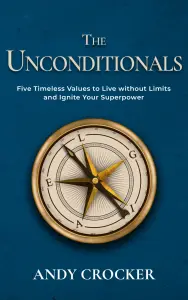Hear the Conversation | Get the Book
 Andy Crocker‘s “The Unconditionals,” reflects a curious trajectory indeed. His journey charts a course from the rigid elegance of orbital mechanics to the subtleties of unconditional love. An aerospace executive with the résumé of a man accustomed to Newtonian certainties and the exactitudes of launch windows, Andy’s shift is less of a pivot than a soft landing into a different kind of mission. For three decades, his professional gravity orbited high-stakes engineering and government contracting—an arena where success is a brightly lit launch and failure, a crater visible from space.
Andy Crocker‘s “The Unconditionals,” reflects a curious trajectory indeed. His journey charts a course from the rigid elegance of orbital mechanics to the subtleties of unconditional love. An aerospace executive with the résumé of a man accustomed to Newtonian certainties and the exactitudes of launch windows, Andy’s shift is less of a pivot than a soft landing into a different kind of mission. For three decades, his professional gravity orbited high-stakes engineering and government contracting—an arena where success is a brightly lit launch and failure, a crater visible from space.
And yet here he is, not in a control room, but in quiet conversation, discussing The Unconditionals, a philosophical treatise anchored not in propulsion but in principle. It is Andy’s post-NASA reckoning, born from disappointment—the loss of not one, but two competitions to develop the next lunar lander—and his subsequent self-exploration that has yielded a different kind of design: five values to live by, quietly audacious in their simplicity.
Love, gratitude, integrity, accountability, and endeavor.
In aerospace, failure is typically framed as something to be minimized, avoided, or explained in a press release. For Andy, however, it became an unlikely muse. The lunar lander contract—“a holy grail type of project,” as he describes The Unconditionals —was not merely another item on a career checklist. It was the culmination of years of momentum, a gravitational center that held together the frustrations and triumphs of government service. When the project went to others, including the more mythic names of Bezos and Musk, the loss was not just financial or professional—it was philosophical.
“You get to the end of that and you step back and say, I had a purpose. What’s my purpose now?” Andy told me. His answer, carefully worked out across the pages of The Unconditional, is a manual for what might be called existential propulsion: the values that sustain motion when external momentum disappears.
The most striking thing about Andy’s treatise isn’t the values themselves—love, after all, is hardly a new idea—but the precision with which he defines them, and the engineer’s clarity he brings to otherwise squishy concepts. Integrity, for example, isn’t merely truth-telling but “wholeness of character”—a consistency not just between what you say and what you do, but between your public convictions and private thoughts. It’s a definition that treats moral life like a structure under stress: any misalignment between load and support will, eventually, collapse.
Unconditional, Actionable Love.
The centerpiece of The Unconditionals, though, is love—agape, the unconditional kind. C.S. Lewis is a north star here, but Andy distills this high-minded concept into something actionable. Respect. Kindness. Compassion. These are, in his view, the working parts of unconditional love. “What’s important,” he writes, “is not that we achieve it in every circumstance, but that we attempt to treat every human being with these three things simply because they are alive.” It’s an engineer’s definition of grace—not mystical, but methodical. Repeatable. Reliable.
One can hear, behind Andy’s even tone, the quiet astonishment of someone who has learned to speak a new language late in life. Raised in the data-driven world of mission schedules and risk matrices, Andy confesses that he’s long had a taste for the philosophical, but kept it, as so many do, in the margins of a practical life. “I really have loved it my whole life,” he says, “shifting out of that data-driven mindset to think about values or philosophy.”
He draws from a theological buffet—Christianity, Judaism, Buddhism, Daoism—while quoting figures as diverse as Dr. Martin Luther King Jr. and Mr. Rogers, whom he calls, without irony, “quite a philosopher.” That may raise eyebrows in certain elite circles, but it’s entirely consistent with Andy’s worldview: wisdom is wherever it’s found, and anyone who teaches respect and kindness deserves a seat at the table.
The quiet radicalism of The Unconditional.
That may be the quiet radicalism of The Unconditional: its insistence that love is not the province of poets and mystics alone, but something an engineer can blueprint. In Andy’s cosmology, endeavor is not just effort but the animating force—“the striving, the doing”—that makes values more than passive virtues. It’s a word with thrust built in. Love may be the launchpad, but endeavor is the ignition sequence.
It’s tempting to call this late-career shift a reinvention, but it’s more accurate to describe it as a reclamation. Andy’s first dream was to become an astronaut. A middle-school science project about space stations lit the fuse, but it was extinguished with a phone call—his eyesight didn’t meet the requirements. “I fell back to something that was almost as cool,” he says now, with a bemused smile. “Being an aerospace engineer.”
A framework for Character.
Now, he’s falling back again, this time to something less visible, less celebrated, but perhaps more enduring. Instead of shuttles, he’s building frameworks for character. Instead of moon landings, he’s interested in moral liftoff. There’s something touching about the image of a man who has spent his life measuring thrust-to-weight ratios now advocating for compassion. It feels improbable, but maybe it shouldn’t. The laws of physics are constant. So too, perhaps, are the laws of decency.
Andy Crocker observes that we are “drowning in content, but starving for wisdom.” His book is, in essence, a life raft. The Unconditionals is small, and quiet, and handmade. But it floats.

